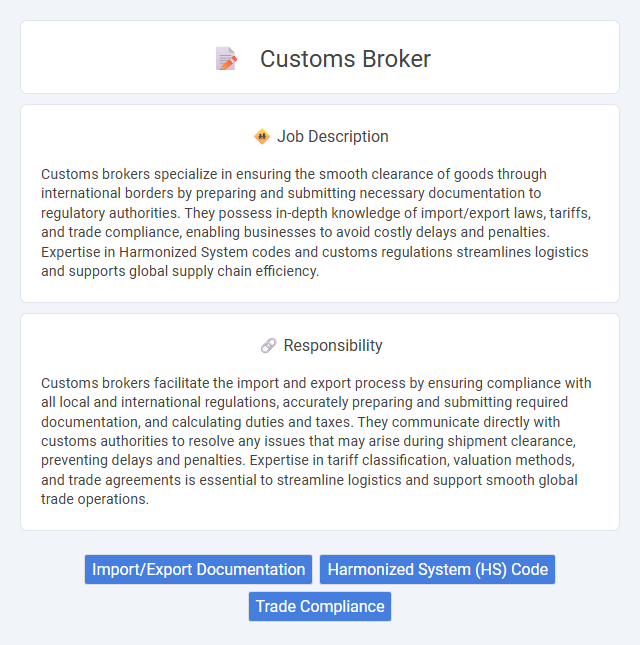
Customs brokers specialize in ensuring the smooth clearance of goods through international borders by preparing and submitting necessary documentation to regulatory authorities. They possess in-depth knowledge of import/export laws, tariffs, and trade compliance, enabling businesses to avoid costly delays and penalties. Expertise in Harmonized System codes and customs regulations streamlines logistics and supports global supply chain efficiency.
People who are detail-oriented and possess strong organizational skills are likely to thrive in a customs broker role, as the job involves managing complex regulations and ensuring accurate documentation. Individuals with good communication abilities and problem-solving skills may also find this position suitable, given the need to interact with clients and resolve clearance issues efficiently. Those who prefer routine tasks or struggle with fast-paced environments may find the demands of a customs broker challenging and less compatible with their work style.
Qualification
Customs brokers must possess a thorough understanding of import and export regulations, including tariffs, duties, and classification codes, often requiring formal certification such as the Licensed Customs Broker credential from relevant authorities. Strong analytical skills and attention to detail are essential for accurately processing shipping documents and ensuring compliance with government requirements. Proficiency in customs software, legal knowledge, and effective communication abilities are crucial for coordinating between clients and customs officials efficiently.
Responsibility
Customs brokers facilitate the import and export process by ensuring compliance with all local and international regulations, accurately preparing and submitting required documentation, and calculating duties and taxes. They communicate directly with customs authorities to resolve any issues that may arise during shipment clearance, preventing delays and penalties. Expertise in tariff classification, valuation methods, and trade agreements is essential to streamline logistics and support smooth global trade operations.
Benefit
Customs brokers likely offer significant benefits by streamlining the import and export process, which may reduce delays and penalties for importers. They probably enhance compliance with complex regulations, minimizing the risk of fines and seizures. Their expertise could result in cost savings through efficient tariff classification and duty reduction strategies.
Challenge
The customs broker job likely involves navigating complex regulations and dealing with frequent changes in international trade policies, which may present ongoing challenges. There is a high probability that brokers must accurately interpret diverse paperwork and maintain compliance under tight deadlines, increasing the risk of errors. Handling unexpected delays or disputes during customs clearance might also prove to be a significant obstacle in this role.
Career Advancement
Customs brokers facilitate international trade by ensuring compliance with customs regulations and handling documentation for shipments. Career advancement opportunities include becoming a senior customs broker, managing customs operations, or specializing in regulatory compliance and trade consulting. Earning certifications such as the Licensed Customs Broker designation or gaining expertise in international trade laws significantly enhances prospects for promotion and higher salary.
Key Terms
Import/Export Documentation
Customs brokers specialize in managing import and export documentation to ensure compliance with international trade regulations. They prepare and verify documents such as commercial invoices, bills of lading, and customs declarations to facilitate timely clearance of shipments. Proficient knowledge of tariff classifications, duty calculations, and trade agreements is essential for accurate and efficient customs processing.
Harmonized System (HS) Code
Customs brokers specialize in classifying goods using the Harmonized System (HS) Code, a globally standardized numerical method for categorizing products in international trade. Accurate HS Code classification is essential to determine duty rates, import restrictions, and compliance with customs regulations, ensuring smooth clearance processes. Expertise in HS Codes minimizes delays and penalties, optimizing supply chain efficiency and cost savings for businesses engaged in cross-border transactions.
Trade Compliance
Customs brokers play a crucial role in trade compliance by ensuring all imported and exported goods meet governmental regulations and classification standards. They manage documentation, tariffs, and duties accurately to prevent legal penalties and delays in shipment clearance. Expertise in international trade laws, customs regulations, and trade agreements is essential for maintaining compliance and facilitating smooth cross-border transactions.
 kuljobs.com
kuljobs.com